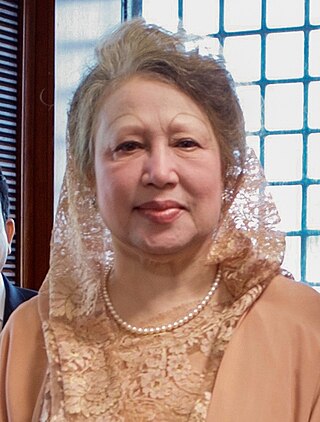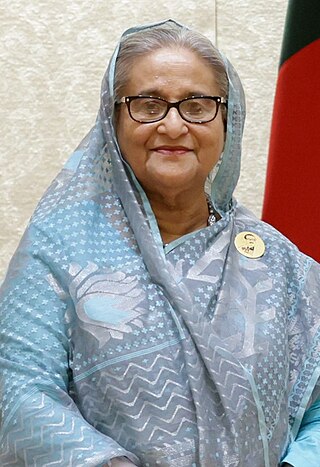
Politics of Bangladesh takes place in a framework of a parliamentary representative democratic republic, whereby the Prime Minister of Bangladesh is the head of government, and of a multi-party system. Executive power is exercised by the government. Legislative power is vested in both the government and parliament. The Constitution of Bangladesh was written in 1972 and has undergone seventeen amendments.

The Bangladesh Nationalist Party is a major political party in Bangladesh. Founded on 1 September 1978 by the late Bangladeshi president Ziaur Rahman, with a view of uniting people with a nationalist ideology, BNP later came out as one of the two most dominant parties in Bangladesh, along with its archrival Awami League. Initially being a big tent centrist party, it moved towards more right-wing politics later.

Begum Khaleda Zia is a Bangladeshi politician who served as the prime minister of Bangladesh from March 1991 to March 1996, and again from June 2001 to October 2006. She was the first female prime minister of Bangladesh and second female prime minister in the Muslim world, after Benazir Bhutto. She is the widow of former president of Bangladesh Ziaur Rahman. She is the chairperson and leader of the Bangladesh Nationalist Party (BNP) since 1984, which was founded by her late husband in 1978.

Sheikh Hasina Wazed is a Bangladeshi politician and the tenth prime minister of Bangladesh from June 1996 to July 2001 and again serving since January 2009. She is the daughter of Sheikh Mujibur Rahman, the founding father and first president of Bangladesh. Having served for a combined total of over 20 years, she is the longest serving prime minister in the history of Bangladesh. As of 24 July 2024, she is the world's longest-serving female head of government.

Hussain Muhammad Ershad was a Bangladeshi military officer and politician who served as the president of Bangladesh from 1983 to 1990, heading a military dictatorship.

Human rights in Bangladesh are enshrined as fundamental rights in Part III of the Constitution of Bangladesh. However, constitutional and legal experts believe many of the country's laws require reform to enforce fundamental rights and reflect democratic values of the 21st century.

The 2006–2008 Bangladeshi political crisis began as a caretaker government (CTG) assumed power at the end of October 2006 following the end of term of the Bangladesh Nationalist Party administration. The BNP government increased the chief justice's retirement age in an unconstitutional way to bias the appointment of the head of the caretaker government. CTG manages the government during the interim 90-day period and parliamentary elections. Political conflict began with the alleged appointment of a Chief Advisor, a role which devolved to the President, Dr. Iajuddin Ahmed. The interim period was marked from the beginning by violent protests initiated by the Awami League named Logi Boitha Andolan, with 40 people killed and hundreds injured in the first month. The Bangladesh Nationalist Party had its own complaints about the process and the opposition.

The history of Bangladesh (1971–present) refers to the period after the independence of Bangladesh from Pakistan.

Mahmudur Rahman is one of the owners and acting editor of one of Bangladesh's Bengali daily newspapers, Amar Desh. He is also an author, engineer and businessman.

General elections were held in Bangladesh on 5 January 2014, in accordance with the constitutional requirement that elections must take place within the 90-day period before the expiration of the term of the Jatiya Sangshad on 24 January 2014.

The 2012 Aleppo Governorate clashes were a series of battles as part of the early insurgency phase of the Syrian civil war in the Aleppo Governorate of Syria.

On 5 February 2013, protests ignited in Shahbagh, Bangladesh, fueled by the call for the execution of the convicted war criminal Abdul Quader Mollah. Previously sentenced to life imprisonment, Mollah was convicted on five of six counts of war crimes by the International Crimes Tribunal of Bangladesh. Mollah supported the West Pakistan during the 1971 Bangladesh Liberation War and played a crucial role in the murder of numerous Bengali nationalists and intellectuals. The demonstrations also sought the government's ban on the radical right-wing and conservative-Islamist group, Jamaat-e-Islami from participating in politics, including elections, and a boycott of institutions supporting or affiliated with the group.

Hefazat-e-Islam Bangladesh is a far-right conservative-islamic advocacy group consisted mostly of hard-line religious teachers and students. The group is mainly based on qawmi madrasas in Bangladesh. In 2013, they submitted a 13-point charter to the Government of Bangladesh, which included the demand for the enactment of a blasphemy law.

The Shapla Square protests also known as Operation Shapla or Operation Flash Out by security forces refers to the protests, and subsequent shootings, of 5 and 6 May 2013 at Shapla Square located in the Motijheel district, the main financial area of Dhaka, Bangladesh. The protests were organized by the Islamist advocacy group, Hefazat-e Islam, who were demanding the enactment of a blasphemy law. The government responded to the protests by cracking down on the protesters using a combined force drawn from the police, Rapid Action Battalion and paramilitary Border Guard Bangladesh to drive the protesters out of Shapla Square.
Chittagong massacre refers to a massacre of opposition activists in Chittagong on January 24 of 1988. The activists of Awami League who were rallying in the streets of Chittagong that day were attacked by the police during the regime of autocratic ruler Hussain Muhammad Ershad. The then Chittagong Metropolitan Police Commissioner Mirza Rakibul Huda ordered the police to open fire on the rally that left at least 24 people dead.
Operation Dal-Bhat was an operation carried out by Bangladesh Rifles to provide grocery items to low income groups in Bangladesh. The operation was carried out during the Caretaker Government of Fakhruddin Ahmed. It was one of the main reasons behind the Bangladesh Rifles Mutiny of 2009. Colonel Mujibul Haque who was killed in the mutiny was in charge of the operation. The mutineers demanded their share of the profits from the operation.
The 2019–2022 Sudanese protests were street protests in Sudan which began in mid-September 2019, during Sudan's transition to democracy, about issues which included the nomination of a new Chief Justice and Attorney General, the killing of civilians by the Rapid Support Forces (RSF), the toxic effects of cyanide and mercury from gold mining in Northern state and South Kordofan, opposition to a state governor in el-Gadarif and to show trials of Sudanese Professionals Association (SPA) coordinators, and advocating the dismissal of previous-government officials in Red Sea, White Nile, and South Darfur. The protests follow the Sudanese Revolution's street protests and civil disobedience of the early September 2019 transfer of executive power to the country's Sovereignty Council, civilian prime minister Abdalla Hamdok, and his cabinet of ministers. Hamdok described the 39-month transition period as defined by the aims of the revolution.
A series of rallies, demonstrations, and blockades opposing the visit of the Indian Prime Minister Narendra Modi were held in Bangladesh from 19 to 29 March, on the celebration of the birth centenary of Bangabandhu Sheikh Mujibur Rahman and the 50th anniversary of Bangladesh's independence from Pakistan. Accusing Narendra Modi of committing crimes against humanity during the 2002 Gujarat riots, the protesters agitated against what they alleged were India's anti-Muslim policies and India's interference in Bangladeshi politics. Protesters demanded the cancellation of the Bangladesh government's invitation to the Indian Prime Minister. The otherwise peaceful protests turned violent when the protesters were attacked by the supporters of the ruling Awami League party along with a crackdown by the law-enforcement agencies, causing the deaths of several protesters throughout the last week of March 2021 in Bangladesh. Initially launched by progressive student organizations including the Bangladesh Students Union, Bangladesh Sadharon Chhatra Odhikar Songrokkhon Parishad, and the Socialist Students' Front, the demonstrations were later joined by the Islamic group Hefazat-e-Islam Bangladesh.

General elections were held in Bangladesh on 7 January 2024 in accordance with the current constitutional requirement, stating that elections must take place within the 90-day period before the expiration of the current term of the Jatiya Sangsad on 29 January 2024. The Awami League, led by incumbent Sheikh Hasina, won the election for the fourth consecutive time with less than 40% of the eligible voters voting according to an Election Commission, which is run by the ruling political party. The party won 224 seats while independent candidates, most of whom were Awami League members propped up as dummy candidates to give a semblance of competition, won 62 seats.

The 2024 Bangladesh Quota Reform Movement is an ongoing anti-government protest in Bangladesh, spearheaded by the students of public and private universities. Initially focused on restructuring the traditional quota-based system for government job recruitment, the movement expanded after the government killed hundreds of protestors and civilians.













